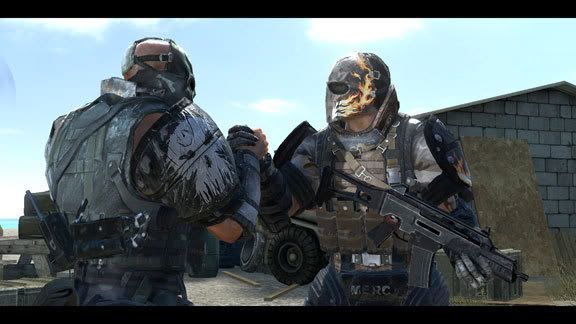 Full disclosure: I had the distinct pleasure of working with a LOT of the people who made this game. I don't think my opinion of it is particularly skewed by that fact, but I can't say for sure.
Full disclosure: I had the distinct pleasure of working with a LOT of the people who made this game. I don't think my opinion of it is particularly skewed by that fact, but I can't say for sure.Overall, I liked it. I mean, I played it through to the end, which is quite rare for me these days. The writing's funny, the graphics are pretty darned good, and the game does a really good job of evoking Springfield - whatever it means to you.
It's really self-referential - the characters know they're in a game, and as a result, it's quite ... er... "gamey." There are a lot of essentially randomly placed collectibles, there's even a whole collection of "game cliches" that you can find, though the fact that the game knows they're cliches doesn't make them any less... overused.
Still, for almost every downside, there's an equal upside. The writing is really quite good - it's as funny as a reasonable episode of the Simpsons that just happens to be focused on games - keeps things clever enough to dress up the relatively generic platforming bits. For the terrible partner AI, there's the option to play with a second live player. The list goes on - for all the characters' special powers, their use in-game is often very hamfistedly scripted - use the Homer Ball here, use Lisa's Hand of Buddha here, etc. It's not a bad thing, it's just that the powers seem so single-use that it's almost like they're keys to locked doors, and not interesting things that the characters can use anywhere.
All in all, it's probably the best Simpsons game ever made. A solid B/80...
Oh, wait. I forgot the camera.
The camera is *horrible*. It is one of the worst implementations of a relatively straightforward camera I've ever seen. It's not that it tries something spectacularly different and fails at it - it's that it tries to be absolutely generic and still manages to be utterly horrid. The worst thing is that conceptually, at least, it's relatively easy to fix. It all has to do with what happens when the camera collides with an object.
In the Simpsons Game, the camera circles the player character at a fixed radius. If there's an object in the way, the camera stops on that object. After a few seconds of being obstructed, the camera then changes to (what feels to be) an arbitrary position. Where the camera moves appears to be completely unpredictable - sometimes it moves nearly 180 degrees, sometimes it moves maybe 10 degrees. If there is a pattern to it, as a player, it's impossible to discern. Sometimes it tries to recenter itself behind your character, other times it doesn't.
For a game where precision jumping is important, having a camera with a mind of its own is an unmitigated disaster. Every time the camera moves during a series of precise jumps, it's the game's fault I die, not mine. The biggest problem is that this is something that's been done to death in other games. This is a "solved problem" - when the camera collides with an object, you move the camera closer to the player until the object is out of the way. In the worst case scenario, the radius R goes to 0. When the camera becomes obstructed by the player, you fade out the player-character so that the player can continue to see the environment.
This prevents the camera from getting stuck on obstacles, generally prevents obstacles from getting in between the camera and the player, and ensures that the camera almost never has to move automatically. At the very least, in some of the sequences that required precision jumping, they could have locked down the camera to a fixed perspective, which would at least have made the jumping easier.
This problem is *so* bad that it almost ruined my enjoyment of the game. Honestly, had another friend of mine not been playing it recently, I probably would just have never bothered to play it again - which is a shame, because a lot of the best levels are closer to the end.
If you're a Simpsons fan, and you go into it knowing the camera's garbage, it's an enjoyable part of the series, and a fun time. If you get frustrated dealing with a finicky camera, this is NOT the game for you, even if ou are a Simpsons fan. If you're not a Simpsons fan, it's probably not really interesting enough to be worth getting anyway. While there are attempts at diversity, the basic platforming is really nothing to write home about.
Still, I played it as a Simpsons fan, and knowing the camera was garbage (I played the demo). It was funnier than many 10th Season-to-Present Simpsons episodes, and a good sendup of games and the game industry in general. I enjoyed it, despite its flaws.
B/55, mostly due to a bad camera and some really, really insipid collectibles.
For a Simpsons fan, who cares more about the "Simpsons" than the "Game" part: B/75 (the camera will still piss you off).



